Relevant Overviews
- Content Strategy
- Online Strategy
- Online Community Management
- Social Media Strategy
- Content Creation & Marketing
- Online Architecture
- Digital Transformation
- Personal Productivity
- Innovation Strategy
- Communications Tactics
- Psychology
- Social Web
- Media
- Politics
- Communications Strategy
- Science&Technology
- Business
I’ve been meaning to blog about the ‘backfire effect’ cognitive bias since first coming across it last December. It went to the top of my ToBlog list thanks to a little serendipity...
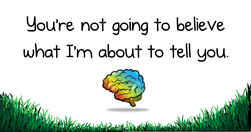
This comic was inspired by this three-part series on the backfire effect from the You Are Not So Smart Podcast.

Our bodies exploit fractal networks to maximize surface areas ... Blood vessels branch out like root systems; the brain houses folds within folds... means we don’t simply enjoy looking at fractals—we are designed to process them effortlessly, and even have a need to be looking at them....That’s also why you might see a face in a cloud... or a prof…
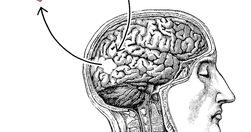
for your most cherished beliefs about things like climate change or vaccines or Republicans, instead of changing your mind in the face of challenging evidence or compelling counterarguments, you resist... your challenged beliefs then grow stronger.

if we can get ourselves to believe something first, we’ll be more effective at getting others to believe it... overconfident people are seen as more competent and have higher social status. ... self-deception evolved for the purpose of other-deception... whenever anyone tries to convince you of something, think about what might be motivating tha…

pulling psychological levers may eventually become the reigning approach to managing workers...By mastering their workers’ mental circuitry, Uber and the like may be taking the economy back toward a pre-New Deal era when businesses had enormous power over workers and few checks on their ability to exploit it... Some of the most addictive games ...…

The objectivity that matters so much in science is not primarily a characteristic of individual scientists but of scientific communities. Scientists rarely refute their own pet hypotheses... Their fellow scientists will be happy to expose these hypotheses to severe testing... Not being afraid of being wrong... is a value we could promote... Intel…
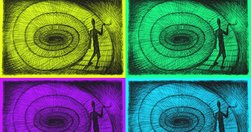
I’ve been asking psychologists variations on a basic question: What research can best help us reckon with uncomfortable social and political realities... Here are seven essential lessons on the hidden forces shaping our views and actions in the Trump era... When Gallup polled Americans the week before and the week after the presidential election,…

"conservatives who received a correction telling them that Iraq did not have [Weapons of Mass Destruction] were more likely to believe that Iraq had WMD." ... fact-checking reinforced the mistaken belief... the "backfire effect."A new paper, however, suggests the "backfire effect" may be a very rare phenomenon.... People are extra happy to adopt a…
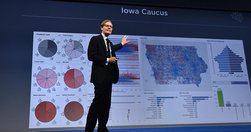
interviews ...suggest that its psychological approach was not actually used by the Trump campaign and, furthermore, the company has never provided evidence that it even works.

There are always “alternative facts.” What matters is how we decide which of those alternative facts are most likely to be true... Conway’s statement based ... on a much older tradition of deciding what is true: the argument from authority.... the culmination of a long retreat from the scientific perspective on truth... pitted against creationist…

If reason is designed to generate sound judgments, then it’s hard to conceive of a more serious design flaw than confirmation bias... a trait that should have been selected against. ... it must have some adaptive function... related to our “hypersociability.” ... Living in small bands of hunter-gatherers, our ancestors were primarily concerned wit…

More than two dozen governments... have a team of behavioral scientists tasked with ... “nudge” their citizens toward what they deem to be higher levels of well-being... “nudges” are value neutral... both achieve altruistic ends or more malicious ones... our environment (and the government) is always exerting some influence on our behavior, so we’…
Several contributors suggested that different media organizations could come together both on a reporting level and on a broader level. There’s the idea for a “‘pooled’ White House new dashboard,” “a new kind of aggregation site for specific topics.”
If there’s a single Top3ic running through the following stories, it’s probably Artificial Intelligence (AI), but I’m deeply into learning about psychology for the moment, so that’s my starting point.

Your brain is the best pattern completion machine in the known universe... But how does it do this? ... new study has unravelled the machinery, right down to the level of individual neurons

The Feynman Machine is both an accurate description of how the brain really works, and a blueprint for Machine Intelligence... I won’t dwell too much on why I believe the Deep Learning boom of today is not the panacea it has been hyped up to appear... The central idea of the Feynman Machine is that regions of the brain form a network of NDSs whic…

Price was the first person ever to be diagnosed with what is now known as highly superior autobiographical memory, or HSAM, a condition she shares with around 60 other known people. She can remember most of the days of her life as clearly as the rest of us remember the recent past

model to assess human beings based on five personality traits, known as the "Big Five." also known as OCEAN... openness, conscientiousness, extroversion, agreeableness, neuroticism... their needs and fears, and how they are likely to behave. ... the problem with this approach was data collection... Then came the Internet. And Facebook... on the b…
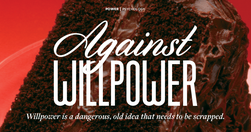
Seeing willpower as a muscle-like force does seem to match up with some limited examples... the analogy is reinforced by social expectations ... But these ideas also have a pernicious effect, distracting us from more accurate ways of understanding human psychology and even detracting from our efforts toward meaningful self-control... Willpower-bas…

While we would like to believe we can persuade people ... with evidence, studies show the other side is likely to become even more deeply entrenched in its view in the face of more information... “politically motivated reasoning,”... people use their minds to protect the groups to which they belong from grappling with uncomfortable truths. The mot…
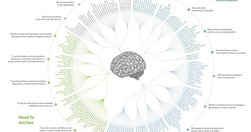
Yet another variation on the Top3ics format: exploring three facets of one topic, highlighting one outstanding resource (plus a few extra links) for each. Today’s theme... psychology
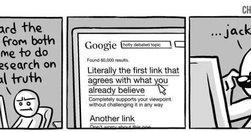
Wikipedia’s list of cognitive biases ... is a bit of a tangled mess... groups 175 biases into vague categories (decision-making biases, social biases, memory errors, etc) that don’t really feel mutually exclusive to me, and then lists them alphabetically... a simpler, clearer organizing structure to hang these biases off of... biases help us addr…

To some liberals, Donald Trump’s inauguration portends doom... to many conservatives, it’s a crowning moment ... as if each side is living in ... a different reality.... information avoidance... all of us ... ward off any new information that makes us feel bad, obligates us to do something we don’t want to do or challenges our worldview... we’re …

A common intuition is that the main goal of science communication is to present facts; once people encounter those facts, they will think and behave accordingly....in reality, just knowing facts doesn’t necessarily guarantee that one’s opinions and behaviors will be consistent with them... Convincing people that scientific evidence has merit and …

the deeper I went into my own work, the more I realized how my always-on, always-connected state had rendered me largely useless... The medium was no longer the message, it was just an asshole. I want my attention back...I could live on Twitter all day, everyday, convincing myself I was being productive. Or, at least inducing the chemicals in the …

Anxious about... propaganda and fake news ... progressives are calling for an increased commitment to media literacy ... Others ... focus on expert fact-checking and labeling. ... fail to take into consideration the cultural context ... Understanding what sources to trust is a basic tenet of media literacy education... underlying assumption ... N…

more than a dozen others on both sides of the gun debate ... agreed to meet face-to-face, tell each other their stories, and try to understand one another’s points of view, in an experiment in radical empathy ... Statistics and argument make no dent in fixed opinions: Each side, incredulous, regards the other as sectarians who’ve somehow got thei…
Americans almost always think that the year coming to a close is the worst... Many misunderstand how the world is changing or ignore positive change... Surveys from long before 2016 — the era before the world turned “post-factual” — show the same levels of ignorance. .. There are several reasons for this...structure of the media means negative sub…

Shitposters, who are bound by nothing, set a rhetorical trap for their enemies, who tend to be bound by having an actual point. Attempts to analyze what shitposters are doing... reinforces their project by amplifying their signal... hitposters resemble the disengaged ironists ... Søren Kierkegaard discussed ... Stories ... are not descriptive of …
Relevant Overviews
- Content Strategy
- Online Strategy
- Online Community Management
- Social Media Strategy
- Content Creation & Marketing
- Online Architecture
- Digital Transformation
- Personal Productivity
- Innovation Strategy
- Communications Tactics
- Psychology
- Social Web
- Media
- Politics
- Communications Strategy
- Science&Technology
- Business